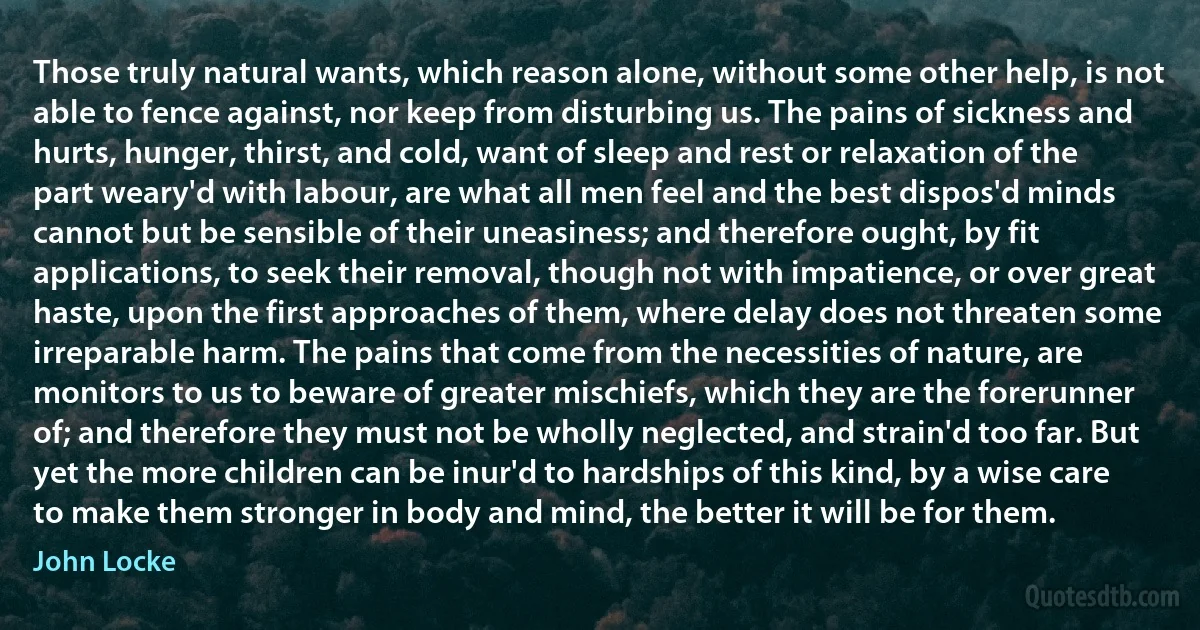
Those truly natural wants, which reason alone, without some other help, is not able to fence against, nor keep from disturbing us. The pains of sickness and hurts, hunger, thirst, and cold, want of sleep and rest or relaxation of the part weary'd with labour, are what all men feel and the best dispos'd minds cannot but be sensible of their uneasiness; and therefore ought, by fit applications, to seek their removal, though not with impatience, or over great haste, upon the first approaches of them, where delay does not threaten some irreparable harm. The pains that come from the necessities of nature, are monitors to us to beware of greater mischiefs, which they are the forerunner of; and therefore they must not be wholly neglected, and strain'd too far. But yet the more children can be inur'd to hardships of this kind, by a wise care to make them stronger in body and mind, the better it will be for them.
John LockeRelated topics
able best body care children cold delay far fence fit great harm haste help hunger men kind mind natural nature nor ought pains reason relaxation removal rest seek sickness sleep thirst uneasiness wise yet labourRelated quotes
[On the attendees at the launch of Apollo 11] Those people were not a stampeding herd, nor a manipulated mob; they did not wreck the Florida communities, they did not devastate the countryside, they did not throw themselves, like whining thugs, at the mercy of their victims - they did not create any victims. They came as responsible individuals able to project the reality of two or three days ahead, and to provide for their own needs. There were people of every age, creed, color, educational level and economic status. They lived and slept in tents, or in their cars, some for several days, in great discomfort and unbearable heat; they did it gamely, cheerfully, gaily; they projected a general feeling of confident goodwill, the bond of a common enthusiasm; they created a public spectacle of responsible privacy - and they departed as they had come, without benefit of press agents.

Ayn Rand
The Doctrine of a Perfect God; in whose nature nothing arbitrary or changeable can have a place; in whose Highest Being we all live, and in this Life may, and ought at all times to be, blessed;-this Doctrine, which ignorant men think they have sufficiently demolished when they have proclaimed it to be Mysticism, is by no means Mysticism, for it has an immediate reference to human action, and in deed to the inmost spirit which ought to inspire and guide all our actions. It can only become Mysticism when it is associated with the pretext that the insight into this truth proceeds from a certain inward and mysterious light, which is not accessible to all men, but is only bestowed upon a few favourites chosen from among the rest:-in which pretext the Mysticism consists, for it betrays a presumptuous contemplation of personal merit, and a pride in mere sensuous Individuality.

Johann Gottlieb Fichte
In order that woman should reach the same standard as man, she ought, when nearly adult, to be trained to energy and perseverance, and to have her reason and imagination exercised to the highest point; and then she would probably transmit these qualities chiefly to her adult daughters. The whole body of women, however, could not be thus raised, unless during many generations the women who excelled in the above robust virtues were married, and produced offspring in larger numbers than other women. As before remarked with respect to bodily strength, although men do not now fight for the sake of obtaining wives, and this form of selection has passed away, yet they generally have to undergo, during manhood, a severe struggle in order to maintain themselves and their families; and this will tend to keep up or even increase their mental powers, and, as a consequence, the present inequality between the sexes.

Charles Darwin
[I]t is altogether reasonable to conclude that the heavenly bodies, _alias_ worlds, which move or are situate within the circle of our knowledge, as well all others throughout immensity, are each and every one of them possessed or inhabited by some intelligent agents or other, however different their sensations or manners of receiving or communicating their ideas may be from ours, or however different from each other. For why would it not have been as wise or as consistent with the perfections which we adore in God, to have neglected giving being to intelligence in this world as in those other worlds, interspersed with [either] of various qualities in his immense creation? And inasmuch as this world is thus replenished, we may, with the highest rational certainty infer, that as God has given us to rejoice, and adore him for our being, he has acted consistent with his goodness, in the display of his providence throughout the university of worlds.

Ethan Allen
To conclude, if we call light, those rays which illuminate objects, and radiant heat, those which heat bodies, it may be inquired whether light be essentially different from radiant heat? In answer to which I would suggest that we are not allowed, by the rules of philosophizing, to admit two different causes to explain certain effects, if they may be accounted for by one. ...If this be a true account of the solar heat, for the support of which I appeal to my experiments, it remains only for us to admit that such of the rays of the sun as have the refrangibility of those which are contained in the prismatic spectrum, by the construction of the organs of sight, are admitted under the appearance of light and colors, and that the rest, being stopped in the coats and humors of the eye, act on them, as they are known to do on all the other parts of our body, by occasioning a sensation of heat.

William Herschel
